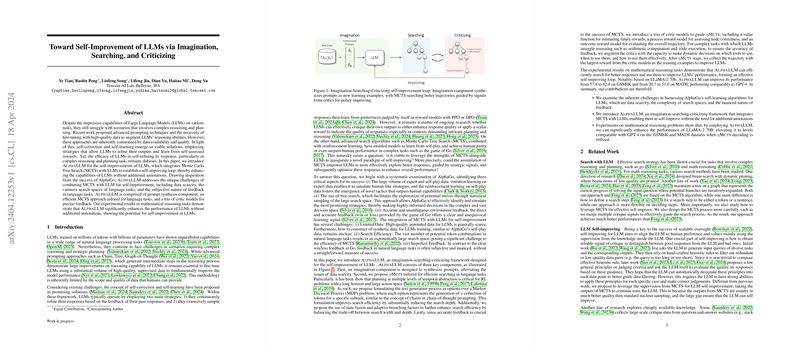Enhancing LLMs with Self-Improving Capabilities: Insights from AlphaLLM
Introduction
LLMs continue to excel across a myriad of NLP tasks. Despite this, their capacity for complex reasoning and strategic planning remains limited. Traditional methods, such as advanced prompting and fine-tuning with high-quality supervised data, face constraints due to data availability and quality. AlphaLLM presents a novel approach by integrating Monte Carlo Tree Search (MCTS) with LLMs, leveraging techniques used in successful AI models like AlphaGo to enhance LLMs’ capabilities without requiring additional annotations.
AlphaLLM Framework
AlphaLLM integrates three core components:
- Imagination Component: This assists in synthesizing prompts to alleviate data scarcity issues.
- Efficient MCTS Approach: Tailored for language tasks, facilitating efficient search by managing the complexity provided by natural language's vast potential state and action spaces.
- Critic Models Trio: Provides precise feedback, comprising a value function to estimate future rewards, a process reward model for node assessment, and an outcome reward model evaluating overall trajectories.
Challenges and Strategies
The incorporation of MCTS with LLMs presents significant challenges including data limitations, search efficiency, and quality of feedback. AlphaLLM addresses these by:
- Data Synthesizing: Generates prompts to expand training data without extra annotations.
- Optimized Search Mechanisms: Implements option-level MCTS and techniques such as importance weighted expansion and state merging to manage the vast search spaces efficiently.
- Enhanced Feedback through Critic Models: Utilizes a sophisticated set of models to provide targeted, nuanced feedback critical for self-learning and correction.
Experimental Setup and Results
AlphaLLM was examined through experiments on mathematical reasoning tasks. The model exhibits promising outcomes:
- Significant improvement in task performance with AlphaLLM self-improvements, achieving a high accuracy level on benchmark tasks.
- Comparable results with the state-of-the-art LLMs like GPT-4 when employing MCTS during inference.
The model leverages minimal labeled data, demonstrating the potential of the self-improving architecture in reducing reliance on vast, labeled datasets.
Potential and Future Directions
AlphaLLM underscores a new vista in enhancing LLMs, pivoting towards self-improvement mechanisms. This model paves the way for more resource-efficient methods in LLM enhancements and opens up several future research pathways:
- Refinement of Data Synthesis: Exploring advanced data synthesizing methods to generate more diverse learning scenarios.
- Dynamic Critic Models: Developing adaptive models that evolve based on the learning progress and changing capacities of the LLM.
- Expansion to Other Domains: Applying the self-improvement framework to domains beyond mathematical reasoning, assessing its effectiveness across various complex tasks.
Conclusion
The development of AlphaLLM marks a significant stride in the quest to harness self-improvement frameworks for LLMs. By melding MCTS with LLMs, it addresses key limitations present in traditional enhancement strategies, offering a sustainable path forward in improving LLM capabilities without excessive annotated data dependencies.
This research not only broadens our understanding of self-improving artificial intelligence but also sets a foundation for future explorations into autonomous, continually learning systems.
